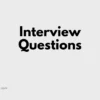Difficult Interview Questions for Managers
Facing the Tough Questions
So, you’ve scored that interview for a managerial position—congrats! But wait, have you thought about those tricky questions you might face? One that always makes my stomach drop is, “How long are you willing to fail before you succeed?” Crazy, right? But here’s the thing: it’s not about giving a perfect answer but showing how resilient you are.
A long time ago in one of my first managerial interviews, I kind of squirmed and fumbled through it. I ended up saying something silly like, “I guess I don’t want to fail at all!” Yikes. What I should’ve said was, “Failure is part of growth; I’d learn and adapt from each mistake.”
Defining a clear strategy and showcasing determination matters a lot. – Acknowledge that setbacks happen. – Emphasize learning from failures. – Share specific examples if you can. Another head-scratcher is, “Can you discuss a time you had to manage a difficult employee?” It sounds so intimidating, but trust me; everyone’s been there. I once had a team member who was great technically but a bit of a diva.
Handling that tension taught me the importance of open communication. I learned that approaching situations with empathy rather than confrontation can make all the difference. – Describe the situation clearly. – Discuss the actions you took. – Emphasize the positive outcomes or what you learned even if it didn’t go as planned.
Bringing Up Skill Gaps
When the interviewers hit you with the “What skill gaps do you have and how do you plan to address them?” question, I mean talk about vulnerability! It’s hard to admit we’re not perfect.
But laid-back honesty can actually play into your favor. I remember once getting grilled about my public speaking skills, which I had always been shy about. Instead of dodging it, I said I’d enrolled in a local Toastmasters club because I wanted to tackle that head-on. Seriously, it took guts, but they appreciated my commitment to self-improvement.
– Show a willingness to learn by discussing online courses or mentorships. – Be realistic but positive about the areas you plan to improve.
– Don’t shy away from sharing past struggles; turning them around shows growth. Interviews can feel like an obstacle course, right? But don’t sweat it. Each difficult question is a chance for you to shine and demonstrate why you’re the perfect fit for the managerial role.
Remind yourself that every awkward moment is just part of the journey—a stepping stone to becoming the leader you’re meant to be!
How to Answer Tough Management Interview Questions
Going into a management interview can be pretty nerve-wracking, right? You’ve got to face those tough questions and still shine like a star! But no sweat, I’ve picked up some tricks over the years that can help you tackle those tricky inquiries head-on.
Tell Your Story
First off, you gotta prepare a story that highlights your leadership skills and accomplishments, related directly to the role you’re interviewing for. Think about when you led your team through a challenging project. It could be about how you improved the sales process or enhanced customer satisfaction—anything that shows you can produce solid results.
Provide Specific Examples
Make sure you pull out examples that have real impact. Maybe there was a time you implemented a new sales system that boosted closing percentages significantly. Share that kind of detail! If you can, use the STAR method: Situation, Task, Action, and Result. It helps organize your answers and shows your problem-solving skills clearly.
Stay Professional
When discussing past managers or any setbacks, maintain a calm demeanor. Always aim to present the facts in a neutral tone and avoid bad-mouthing previous bosses. This shows you can handle pressure and approach disagreements maturely. Trust me, that attitude speaks volumes to potential employers!
Craft Thoughtful Questions
Prepare questions that demonstrate critical thinking about challenges faced in management previously. You might ask, “What challenges are the management team currently navigating?” This not only shows your insight but also allows you to tailor your answers based on their responses.
Don’t Shy Away from Weaknesses
When they ask about weaknesses, it’s crucial to present them constructively. Pick a skill that you recognize needs work, and explain how you’re actively improving it. This displays self-awareness and commitment to growth, which any employer appreciates.
Closing with Impact
Finish strong with a concise summary of your skills. Highlight how your past problems and the steps you took to solve them make you a perfect fit for their team. Maybe mention your dedication to continuous learning through courses or employee development programs.
Remember, it’s all about connecting the dots between your past experiences and the new role. Everyone wants to feel they can rely on you, so show them you can deliver results even under pressure!
Common Challenging Interview Questions for Leaders
When it comes to leadership roles, interviews can be a tough ride, huh? You often face some tricky questions that really make you think about your approach to management and team dynamics.
Let’s break down some of those challenging questions and what they might be getting at:
1. What is your leadership style?
Describing your leadership style is a big deal. It gives interviewers insight into how you manage folks, handle conflicts, and motivate your team. Think about how you usually approach situations—are you more democratic, or do you lean towards a more autocratic style? Being clear on this will show your strengths.
2. Can you give an example of a difficult decision you had to make?
This question is tough because it tests how you balance team welfare and the goals of an organization. You might talk about a time when you prioritized your team’s well-being but had to make choices that also aligned with big-picture goals. It shows your adaptability under pressure.
3. How do you handle team disagreements?
Disagreements happen in every team. How you respond says a lot about your leadership skills. Active listening and conflict resolution are key, right? It’s not just about resolving the issue, but also about maintaining harmony in the workplace. A solid example of this can really set you apart.
4. How do you ensure projects stay on track?
This question is a testament to your strategic planning abilities. Regular progress evaluations are essential. Talk about tools you use, or your approach to setting milestones that help ensure deadlines are met. The clearer you are, the better.
5. How do you foster innovation in your team?
Ah, innovation! It’s essential for growth. You want to talk about creating a safe environment where team members feel confident to think outside the box, right? Risk-taking can lead to great outcomes, making it vital to show how you inspire that in others.
Being ready with these kinds of responses can really show your potential employer that you understand what effective leadership involves. So, gear up and reflect on your journey—your experiences will shine through! Plus, being open and transparent in your answers tends to really resonate with interviewers.
Sample Answers for Manager Interview Questions
When you’re heading into a manager interview, expect questions that probe your style, how you inspire your team, and if you can handle the kinda messy stuff like conflict and performance issues. Let’s break it down with some sample answers that might just help you sound like a superstar in your next interview!
Describing Your Management Style
For example, if asked about your management style, you might say:
“I believe in a participative approach. I like to involve my team members in decision-making, which not only empowers them but also fosters innovation. On the flip side, I can be directive when needed, especially if there’s a tight deadline.”
This shows that you’re adaptable, which is key for a manager.
Motivating Your Team
A common question is “How do you motivate your team?” You could respond with, “I make it a point to recognize achievements, big or small! I also set clear, attainable goals and celebrate milestones. Creating an environment where my team feels valued is crucial.” This reflects a solid understanding of what keeps morale high.
Handling Conflict
Conflicts happen, right? When asked about handling conflict, saying, “I practice active listening and ensure that everyone involved has the chance to express their views. Then I work with the team to find a compromise that respects everyone’s needs.” can showcase your mediation skills.
Addressing Underperformance
Now, addressing underperforming employees can be a tough topic. You might say, “I believe in open communication. I set performance goals and provide constructive feedback regularly. If improvement isn’t seen, I outline the necessary steps and make sure they have the support they need.” This exhibits a supportive yet firm approach.
Making Difficult Decisions
When you face a tricky decision, it can be side-stepped with a response like, “I weigh the pros and cons carefully and consult with my team. For instance, when we had to decide on resource allocation, I gathered input from my team and made an informed decision that everyone felt part of.” This shows collaborative decision-making!
Measuring Success
Finally, when asked about measuring success, an answer could be, “I look at a mix of team performance metrics and employee engagement. If our projects meet their goals and the team feels motivated, then I consider that a win!” This highlights your awareness of both metrics and team dynamics.
Perfect preparation is key. Practicing these answers with a friend can get you feeling real comfortable during the interview.
Behavioral Interview Questions for Management Positions
When you’re interviewing for management roles, one thing that’s super important is how you adapt to change. Behavioral interview questions shine a light on this adaptability. For instance, you might be asked, “Can you describe a time when you had to lead your team through a significant change?” This question not only evaluates your personal experience but shows how well you can navigate unexpected situations.
Collaboration and Working Styles
It’s also crucial to collaborate with team members who may have differing working styles. A question like, “Give me an example of how you worked with a team member who had a very different approach,” can help interviewers gauge your ability to foster a cooperative environment. Trust me, this skill is gold when building harmony within a team.
Motivating Others
Another area you might be quizzed on is your methods for motivating others. Think about sharing how you’ve used recognition or clear goal setting to inspire your team. As an interviewer, asking “How do you motivate your team during tough times?” gives insight into your leadership style.
Tackling Employee Behavior Issues
Behavioral issues are bound to pop up too. Interviewers could throw in questions like, “Tell me about a time when you had to address a tricky employee behavior issue.” Here, showing off your tact and communication skills is key.
Project and Team Leadership
Leading a project to success means strategic planning. Consider questions such as, “Describe a successful project you led, and what made it effective,” in forming a well-rounded response. It’s about showing you empower your team and foster growth.
Adapting to Organizational Change
Management positions often require you to lead teams through changes. A good example question is, “Can you share how you communicated with your team during a major organizational change?” This illustrates your resilience and communication prowess.
STAR Method
Utilizing the STAR method can be super helpful when answering these questions. This structured way helps paint a clearer picture of your experiences. It’s compelling to provide a real-life example that not only shares what you did but also the impact it made.
Don’t forget the importance of quickly making decisions under pressure. “Describe a time you had to make a quick decision with little time” can reveal how you handle tight deadlines. Every question is a window into the kind of manager you’ll be!
Strategies for Answering Tough Interview Questions
Interviews can be a real rollercoaster, especially when you’re hit with those tricky questions that make you sweat a bit. I remember one time, I was in the hot seat, and the interviewer asked me about my biggest weakness. Instead of saying “I have none,” which definitely doesn’t fly, I shared how I adapt to challenges. It’s all about showing your growth and how you handle situations, right?
Before you leap into an answer, take a moment to gather your thoughts. It’s like pausing to strategize your next play. You don’t wanna rush into it. A few seconds here can help you articulate your response better.
Now, let’s talk about the STAR method. It’s a lifesaver! This technique structures your answers by guiding you through the Situation, Task, Action, and Result. For instance, when asked about a challenge I faced in a past role, I’d lay out the specifics: what the issue was, what I needed to accomplish, what steps I took, and the outcome. This framework keeps your answer focused and impactful.
Another tip? Do your homework on the company culture. This way, you can align your responses with their values. If they prioritize teamwork and innovation, highlight your experiences that show you’ve thrived in similar environments.
Be ready to discuss your management philosophy too. Interviewers want to know how you lead—are you collaborative, or do you prefer a hands-on approach? Sharing personal anecdotes helps ground your answers.
- Practice asking insightful questions. This shows you’re engaged and understand the role.
- Don’t shy away from discussing what you’ve learned from experiences—both good and bad. This shows your adaptability and willingness to grow.
Finally, confidence is key. Make sure you can clearly articulate your reasoning behind your answers. Own your experiences and the lessons they’ve taught you! That’s what really sets you apart.
Prep Like a Pro: Manager Interview Difficult Questions
Landing a manager interview? Time to roll up your sleeves! Preparing for tough interview questions means arming yourself with the right tools and insights. Trust me; a little prep goes a long way. Here’s how you can tackle it.
Know the Company Culture
First things first, get a grasp on the company culture. You don’t wanna go in there and clash with their values! Research the organization and align your leadership style with what they stand for. If you’ve got a people-first approach and they value collaboration, highlight that in your responses. It shows you’re a great fit!
Use the STAR Method
When asked tough questions, structure your answers with the STAR method: Situation, Task, Action, Result. For instance, someone might say, “Can you share a time when you faced a tough decision?” Share that situation, what you had to do, the actions you took, and, most importantly, the outcome!
Ask for Clarification
If a question throws you off, don’t hesitate to ask clarifying questions. It’s perfectly fine to ensure you really understand what they’re looking for. This not only helps you focus your answer but also shows that you’re thoughtful in your approach.
Process Before Responding
Here’s my pro tip: take a few moments to process your thoughts before diving in. It might feel awkward at first, but a brief pause can lead to more coherent and confident responses.
Think Out Loud
When answering difficult questions, don’t just spit out the answer. Discuss your thought process and reasoning. Employers are interested in how you tackle challenges and how you think on your feet. It’s not just about the answer; it’s about how you got there!
Practice Makes Perfect
Familiarize yourself with common manager interview questions. This will not only boost your confidence but will also enhance your overall performance. Think about both general questions and specific ones that relate to the role you’re applying for. You got this!
Preparing for these tough scenarios is crucial. With some time and energy invested, you’ll shine in your manager interview. And honestly, who doesn’t love a little bit of confidence boost?





